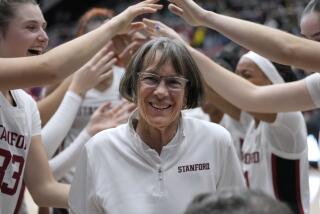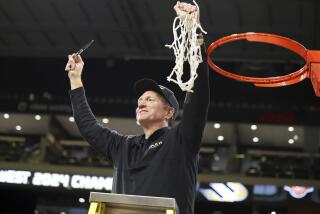Steady He Goes
The man who hired Mike Montgomery at Stanford 18 years ago turned on his television the other day and had to laugh.
There was Montgomery, doing one of those live-remote interviews, talking to a couple of guys in a studio as he sat in a chair on the Stanford campus.
“They tried to get him all excited about being undefeated and the magnitude of it,” said Andy Geiger, the former Stanford athletic director now at Ohio State.
“And Mike was arguing with them, in his way. Not that he wasn’t being nice, but there’s a bit of a curmudgeon in Mike. He’s a grumpy old man sometimes.
“He’s not in the game for sound bites, I’ll tell you that. He doesn’t think that way.”
Montgomery’s penchant for logic that goes against convention has led him to be called a “contrarian” and a “glass-half-empty guy.”
But after following a trip to the 1998 Final Four with a run at a perfect regular season this year that ended one game shy with a loss to Washington, he also is routinely called the best coach on the West Coast.
(And yes, that purposely excludes Tucson and Arizona’s Hall of Fame coach, Lute Olson.)
After nearly two decades in Palo Alto, Montgomery is as much a fixture at Stanford as the Tree mascot, though he is considerably more reserved.
He is a Southern California guy who has gone Northern California. But he got his start here, growing up in Long Beach, and next month after the NCAA tournament he will receive one of the biggest honors of his career at the Los Angeles Athletic Club when he is presented the John R. Wooden “Legends of Coaching” award.
He’ll be in good company: The only previous recipients are Dean Smith, Mike Krzyzewski, Olson, Denny Crum and Roy Williams.
Wooden doesn’t choose the recipient, but he couldn’t be more pleased.
“I’m partial to Mike. I held Mike in my arms when he was a baby,” Wooden said. “When I came to UCLA in 1948, his father was on the faculty in the physical education department. I’ve known him since that time. He’s kind of special to me.
“I’ve been impressed with the program he runs and the team play of his teams. That’s the most important thing, and not just this year when they came close to going undefeated.”
Fast-forward more than 50 years from Wooden’s embrace, and there could have been nothing more poetic than for Montgomery to become UCLA’s coach.
Before hiring Ben Howland last spring, UCLA Athletic Director Dan Guerrero and Associate Athletic Director Betsy Stephenson met quietly with Montgomery, now 57.
“I was happy to talk with them, although I had kind of said, ‘I don’t really want to be a candidate, but I think we should talk,’ ” Montgomery said.
“I thought out of respect for the number of years I’d been in the league and my background, that they were nice enough to call.
“I probably would have regretted it if we hadn’t [discussed the job], just because my parents both went to school there. I was raised with UCLA, so it’s always been there. We had a nice conversation, and I think that the right thing happened for everybody.”
That being coach at Stanford could ever be considered a better situation than being at UCLA is incomprehensible to many. But Montgomery’s career has led him to a place that suits him.
He has built a program that has reached the Final Four and been ranked No. 1 during three seasons, including this one.
Yet it is a job that comes without the pressures and occasional player scandals of a UCLA -- but offers a commute from heaven. Montgomery and his wife, Sarah, live about a mile and a half from campus in Menlo Park. (Their son, John, plays basketball at Loyola Marymount, and their daughter, Anne, plays volleyball at USC.)
Montgomery had a modest basketball career in the late 1960s at Long Beach State -- where his father, Jack, previously had served as athletic director.
After graduating in 1968, Montgomery signed up for the Coast Guard Reserve.
“Vietnam was not a great option at the time,” he said. “All the politicians are getting criticized now, but it wasn’t a very popular thing to do.”
His opposition to the war wasn’t philosophical, but personal.
“I wasn’t politically tuned in to anything,” he said. “I used to go by the demonstrations at Long Beach State almost every day.
“But my thing was, I would just go to the gym, play some hoops, play some volleyball. I wasn’t really politically one way or the other, but it wasn’t getting a lot of positive vibes.
“I had friends that I knew, good friends, that were killed. That shakes you up a little bit. It’s not like you’re going to go over there and it’s going to be a picnic. You had firsthand knowledge of people that didn’t come back.”
At the Coast Guard Academy, Montgomery found his way into coaching.
“I met a guy there and went up and told him I wanted to coach,” he said. “Through some connections and pulling some strings, they took me out of my duty and moved me into the athletic department, where I taught and coached the freshman basketball team and helped with the varsity.”
After five stops as an assistant coach, he landed his first head-coaching job at Montana in 1978.
Eight seasons later, after four consecutive 20-win seasons, he was hired at Stanford to replace a discouraged Tom Davis, who left for Iowa after only four seasons, having managed to get above the .500 mark only once.
Davis, who went on to a prominent career with the Hawkeyes and came out of retirement this season to coach at Drake, said he was pleased by what happened after he left.
“I congratulate Andy Geiger on having the foresight to hire Mike Montgomery,” Davis said. “Mike’s done an incredible job.”
Davis said that although he was able to interest elite student-athletes in Stanford -- recognized in coaching circles for making fewer admissions concessions than, say, Duke -- he wasn’t able to land enough of them.
He remembers sitting in the office of Condoleezza Rice -- a Stanford professor at the time and now President Bush’s national security advisor -- trying to recruit Quin Snyder, a player who eventually chose Duke and is now Missouri’s coach.
“The only thing we couldn’t convince Quin Snyder of was that we were close to winning,” Davis said.
When Davis left, Geiger -- who had been impressed with Montgomery when Montgomery applied for the job the previous time -- got back in touch.
In Montgomery’s first season, Stanford went 15-13, led by sophomore Todd Lichti, the key recruit of Davis’ tenure.
The next season, Stanford won 21 games and went to the National Invitation Tournament and signed a future NBA player from Orange County named Adam Keefe. The year after that, Stanford went 26-7 and reached the NCAA tournament.
“Adam was the first real key guy,” Montgomery said. “He was the first kid we’d ever beaten North Carolina, Duke and Notre Dame on.”
Point guard Brevin Knight was an impact recruit from the East Coast.
Later, Montgomery landed the 7-foot Collins twins, Jason and Jarron, from North Hollywood Harvard-Westlake after they’d been at the famous UCLA recruiting dinner that led to Jim Harrick’s downfall. (Purely coincidentally, the dinner was at a Westwood restaurant called Monty’s.)
When Stanford reached the 1998 Final Four and Glendora High’s Casey Jacobsen didn’t even consider UCLA before choosing Stanford, you could definitively say the Cardinal had arrived.
“I think Mike is very smart, very patient, and waited it out,” Geiger said. “The big change isn’t that Mike Montgomery all of a sudden became a terrific coach. The change is he was able to convince gifted basketball players who had the academic background that Stanford could go very, very far.”
Olson, who watched Stanford replace UCLA as Arizona’s most fierce competition in the Pacific 10, also believes the change has been in the caliber of athletes.
“When you look back, there were some rough years, but there was never a case where he wasn’t doing a very, very solid job,” Olson said. “They’re not going to beat themselves. They’re very tough inside and outside, offensively. Defensively, they play a containment-style defense.
“I’ve felt this way about Mike even when they went through a couple of bad years. There’s no question he’s as good as anybody we’ve had around.”
Montgomery’s public persona is generally understated, though he found himself in the middle of a maelstrom last fall after quotes attributed to him in the Washington Post made it appear that he was accusing Florida Coach Billy Donovan of cheating in recruiting, though he hadn’t used Donovan’s name.
Montgomery said he didn’t believe he made the comments and if he did, he didn’t intend them for publication, but apologized to Donovan nonetheless.
Nebraska Coach Barry Collier, a former Stanford assistant and good friend, laughs about it now. “I immediately resigned as his PR agent,” Collier said.
Like others, Collier comes back around to Montgomery’s unique way of thinking when he tries to explain his success.
“Really, from the beginning, I think Mike was always -- and this is not very sexy -- but he is probably the most logical coach I’ve ever known,” Collier said.
Players say they appreciate his straightforwardness.
“He’s extremely honest with you, which I like in a coach,” point guard Chris Hernandez said. “He keeps us grounded.”
That doesn’t mean there aren’t times Montgomery is difficult to understand.
Hernandez says the coach strikes him as more “Montana-ish” than Southern Californian.
“He likes sayings like, ‘The hay’s in the barn,’ or ‘What’s good for the goose is good for the gander,’ or ‘The duck’s in the water,’ ” Hernandez said. “I have no clue about that one.”
Montgomery has his own logic, but not everyone can follow it.
“He does look at things in a different way that can be confounding,” Geiger said. “You’re not sure if you’ve won the argument or finished the conversation.
“You look at the quotes from that incredible victory over Washington State. He wanted the guys to learn from what might have been a loss -- to psychologically celebrate a victory and yet learn from a loss.”
Now that Stanford has indeed lost, even people with as much authority as Olson are saying it was better to lose now, that it eases the pressure before the NCAA tournament.
It’s a popular logic Montgomery won’t stomach.
“It’s never better that you lose,” he said.
*
(Begin Text of Infobox)
Coaching Contrasts
Coach Mike Montgomery has put together a 389-166 record in 18 seasons at Stanford. Since the 1986-87 season, when Montgomery took over, there have been seven coaches at UCLA and USC. A look:
*--* UCLA Name Seasons Record Walt Hazzard 1984-88 *41-21 Jim Harrick 1988-96 192-62 Steve Lavin 1996-2003 145-78 Ben Howland 2003-present 11-16 389-177 USC Name Seasons Record George Raveling 1986-94 115-118 Charlie Parker 1994-96 21-28 Henry Bibby 1996-present 129-80 265-226 * Hazzard’s record for 1986-88.
*--*
The 500 Club
Active Division I men’s coaches with 500 or more victories who have not won an NCAA title:
*--* Name Current Team Wins Lou Henson New Mexico State 775 Eddie Sutton Oklahoma State 748 John Chaney Temple 708 Hugh Durham Jacksonville 617 Billy Tubbs Lamar 606 Tom Davis Drake 555 Mike Montgomery Stanford 543 Bob Huggins Cincinnati 538 Cliff Ellis Auburn 534 Gene Keady Purdue 524 Don DeVoe Navy 512
*--*
More to Read
Go beyond the scoreboard
Get the latest on L.A.'s teams in the daily Sports Report newsletter.
You may occasionally receive promotional content from the Los Angeles Times.










